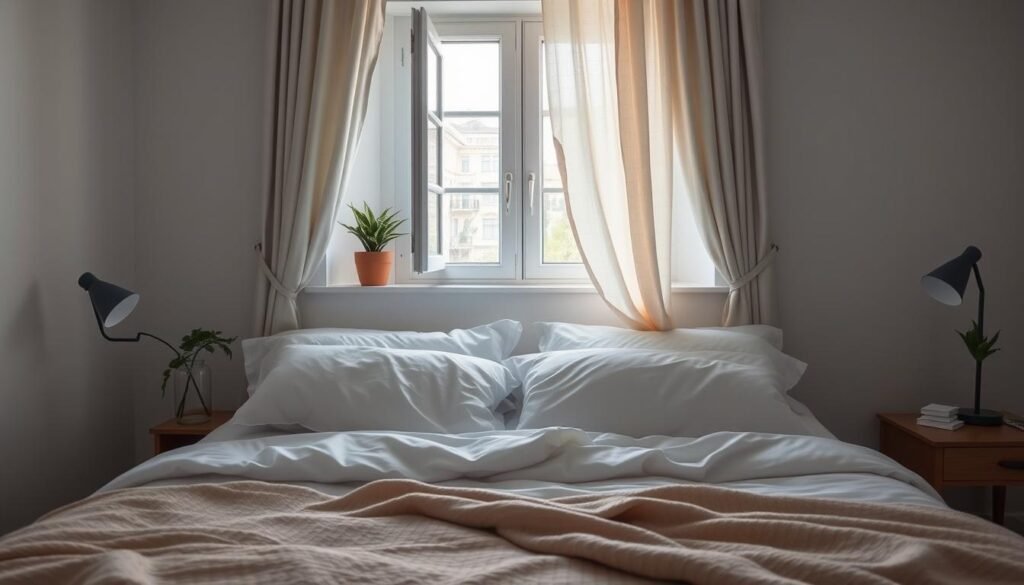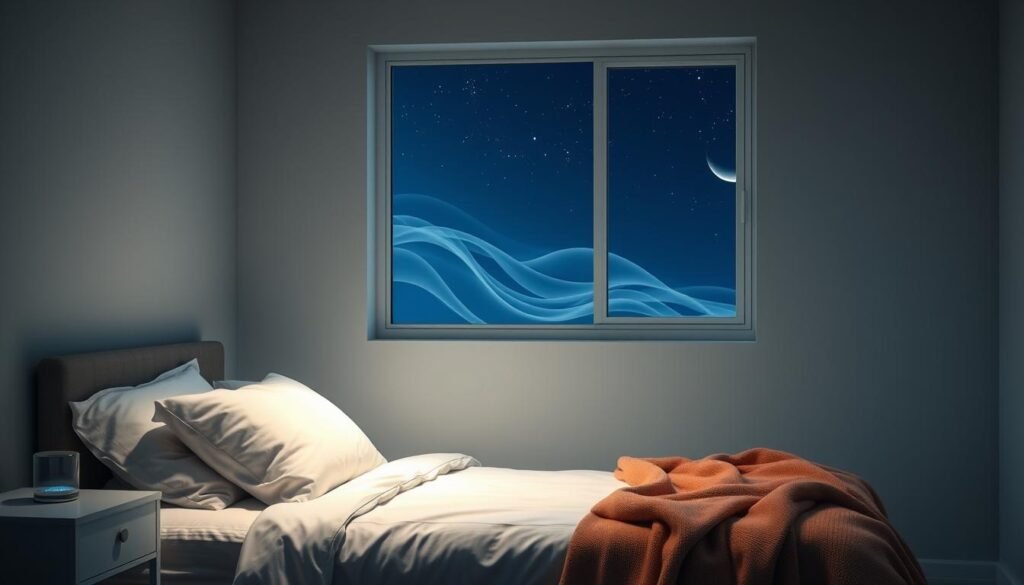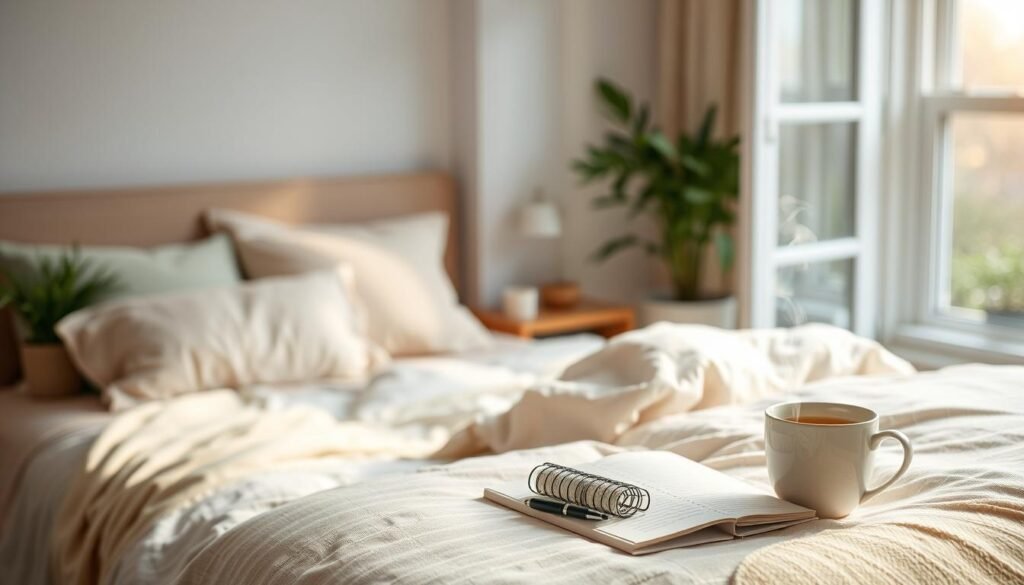Nearly 20% of American adults struggle with anxiety disorders. This greatly affects their mental well-being. Sleep anxiety has grown into a major concern, worsened by day-to-day stresses. It’s been found that poor sleep can amplify anxiety the next day. Such a loop is hard for many to escape from. This guide offers ways to deal with sleep anxiety, focusing on better sleep habits and more peaceful nights.
Readers will learn much more about sleep anxiety, why it happens, its signs, and how it’s linked to both anxiety and sleep troubles. We’ll look at helpful strategies, including relaxation methods and cognitive behavioral therapy. These approaches are designed to fight off sleep anxiety. By trying these methods, folks can look forward to more peaceful sleep and lessen sleep anxiety’s toll on their daily lives.
Key Takeaways
- About 20% of American adults experience anxiety disorders, affecting their sleep quality.
- Lack of sleep can lead to increased mental distress and anxiety the following day.
- Understanding the root causes of sleep anxiety is crucial for effective coping.
- Relaxation techniques can significantly help alleviate sleep anxiety.
- Maintaining proper sleep hygiene plays a vital role in managing anxiety levels.
- Cognitive behavioral therapy can provide structured support for overcoming sleep-related issues.
Understanding Sleep Anxiety
Sleep anxiety is the worry about not being able to fall asleep. It leads to insomnia and affects many people. Individuals often feel tense about not getting enough sleep. This can start a cycle of worry and sleepless nights. In the U.S., about 40 million adults suffer from anxiety disorders. This makes them more likely to have trouble sleeping.
Statistics show that one-third of adults struggle with chronic insomnia. This problem is often linked to sleep anxiety. People with anxiety have a hard time relaxing. This makes falling asleep difficult. Relaxation practices like meditation can help improve sleep habits.
Not handling sleep anxiety well can make things worse. It can increase the risk of chronic problems like depression. Good sleep and mental health are closely connected. Simple changes in daily habits can enhance sleep quality. Also, cognitive behavioral therapy has been effective for insomnia due to anxiety. It helps treat both issues, leading to better sleep.
- Approximately 40% of individuals with anxiety also report experiencing insomnia.
- Adults typically require 7-9 hours of uninterrupted sleep to function optimally.
- Long-term stress and anxiety can trigger various physical health issues, including heart problems and a weakened immune system.
Managing sleep anxiety is key to well-being. It’s important to tackle anxiety and sleep problems together. Promoting healthy lifestyle choices is also crucial.
Causes of Sleep Anxiety
Understanding what leads to sleep anxiety is key. Many things add to this problem, like how we live, our minds, and our genes. How we live has a big impact. Not sleeping on a regular schedule, drinking too much caffeine, and not moving enough can make anxiety worse. This makes it hard to sleep well.
Our mental health matters too. People who have gone through tough times or who are always stressed often struggle to sleep. Millions are affected by anxiety issues, like general anxiety disorder (GAD) and social anxiety disorder (SAD). Studies show these are more common in young people under 35, and they can cause sleep problems.
Genes play a part as well. Having a family history of mental health issues can make it more likely for someone to have anxiety. This means they might also have trouble sleeping.
Anxiety can ruin a good night’s sleep. It can make it hard to fall asleep, lead to a restless night, and leave you feeling tired in the morning. Almost all people with PTSD deal with insomnia. The constant worry from anxiety can cause physical signs. These include a fast heartbeat and tense muscles, which make sleeping even harder.
How Anxiety and Sleep Are Interconnected
Anxiety and sleep are closely linked, affecting our day-to-day life. Around 50% of people with generalized anxiety disorder struggle with insomnia. This shows how anxiety and sleep problems are related. Not getting enough sleep can make anxiety worse the next day. This creates a vicious cycle. It can cause sleep loss, making both anxiety and sleep issues more severe.
At night, people with anxiety might worry more. Lack of sleep makes it hard to socialize, focus, or do daily tasks well. It’s key to treat both anxiety and sleep issues. Cognitive-behavioral therapy (CBT) helps with anxiety. For sleep problems, cognitive-behavioral therapy for insomnia (CBT-I) is very helpful.
Studies show that sleep problems may lead to anxiety disorders. This stress the need for timely help. Dawn Health’s therapy offers quick access and takes insurance for mental health. A calm bedtime routine is very helpful for those with anxiety and sleep issues. Taking warm baths, doing deep breathing, and reading can lead to better sleep.
To sleep better, try to avoid screens an hour before bedtime. This helps keep the body’s sleep-wake cycle normal. Also, avoid caffeine and alcohol before bed as they can disturb sleep. Aiming for 7-8 hours of sleep each night is important, but needs can vary.
Regular exercise of moderate intensity can improve sleep and lessen anxiety. By understanding how anxiety and sleep affect each other, we can take steps to improve both. This leads to better mental and physical health.
Understanding the link between anxiety and empowers readers to seek help for better management.
Identifying Symptoms of Sleep Anxiety
It’s important to know the symptoms of sleep anxiety for better handling. People might feel a mix of physical symptoms and emotional symptoms. Knowing these signs helps seek the right help.
Some common physical symptoms include:
- Tense muscles
- Rapid heartbeat
- Difficulty falling or staying asleep
- Increased heart rate
- Muscle tension
The emotional symptoms can be:
- Feelings of restlessness
- Irritability
- General feelings of unease
- Racing thoughts
- Difficulty concentrating
Seniors might feel overwhelmed, affecting their sleep. This feeds into their physical symptoms and emotional symptoms of sleep anxiety. It’s different from insomnia and needs careful evaluation.
Evaluating sleep anxiety requires looking at medical conditions. Knowing the cause helps in finding coping methods and prevention.
| Type of Symptoms | Examples |
|---|---|
| Physical Symptoms | Tense muscles, Rapid heartbeat, Sleep disruptions |
| Emotional Symptoms | Restlessness, Irritability, Racing thoughts |
Identifying these symptoms is key to a good treatment plan. This plan tackles the complex aspects of sleep anxiety.
Effective Coping Strategies for Sleep Anxiety
Dealing with sleep anxiety requires using a mix of strategies. These must promote both relaxation and mental clearness. Adding good coping strategies significantly reduces worries about sleep problems. Including calming techniques in your evening routine is key for a peaceful sleep.
Relaxation Techniques
It’s vital to create a soothing bedtime routine. Shutting off gadgets an hour before sleeping cuts down distractions. It also helps your mind settle. Doing calm activities, like reading or gentle yoga, readies your body for rest.
Breathing Exercises
Slowing down your breath is a great way to calm your mind. Deep belly breathing, for instance, helps manage your heart rate. This and similar techniques can ease the shift into sleep.
Progressive Muscle Relaxation
With progressive muscle relaxation, you can pinpoint and ease tension in your body. This method not only raises stress awareness. It also lowers anxiety before sleep. Doing this regularly makes you feel more relaxed and improves sleep.
Improving Sleep Hygiene
Enhancing sleep hygiene is key to easing sleep anxiety. Those who find it hard to sleep can see improvement with simple steps. Keeping a regular sleep schedule helps set the body’s sleep-wake rhythm. This routine leads to better sleep and improved mental health.
Establishing a Consistent Sleep Schedule
Having a fixed time to sleep and wake up every day is critical. It keeps your body’s natural clock in check and lessens the urge to nap during the day. If you need to change your sleep time, do it slowly. And make sleep a priority by picking a specific bedtime. Tactics like meditation before bed can help calm your mind. For more on these strategies, visit this resource.
Creating an Ideal Sleep Environment
Setting up your bedroom right can make a big difference in sleep quality. The best sleep space is cool, dark, and quiet. Experts suggest keeping the room between 60 and 67°F (15.6 and 19.4°C) for comfort. To avoid disturbances, use things like curtains, earplugs, or white noise machines. Adding soothing scents, like lavender, can help you relax and improve your sleep cleanliness.
| Sleep Hygiene Factors | Recommendations |
|---|---|
| Consistent Sleep Schedule | Go to bed and wake up at the same time every day. |
| Optimal Temperature | Maintain a temperature between 60 and 67°F. |
| Bedroom Darkness | Use blackout curtains to block external light. |
| Quiet Environment | Utilize earplugs or white noise machines to minimize sounds. |
| Relaxation Techniques | Engage in meditation or calming activities before bed. |

Mindfulness Meditation Techniques
Mindfulness meditation helps with sleep anxiety, boosts mental clarity, and supports overall well-being. It focuses one on the now, reducing disturbing thoughts. By being mindful, we learn to watch our emotions and thoughts without judging. This helps us relax and ease anxiety.
Adding mindfulness meditation to your daily life can greatly reduce stress. It often improves sleep by helping you control your emotions and feel calmer. Techniques like guided meditations, yoga, and deep breathing can all aid in handling anxiety. They increase self-awareness, so we notice what makes our anxiety worse, especially at night.
Mindfulness also helps manage our stress response system. Regular practitioners see healthier sleep-wake cycles. Research, like that in the Journal of Research in Personality, shows being mindful improves our coping skills and stress resilience.
If you’re fighting insomnia or anxiety at night, try these mindfulness techniques. They help you better deal with anxiety and lead to peaceful sleep. To learn how meditation helps with sleep, check out this meditation guide.
Cognitive Behavioral Therapy for Insomnia
Cognitive Behavioral Therapy (CBT) for Insomnia is a top way to treat sleep troubles. It targets the root causes of insomnia. By changing negative thoughts and habits, people can sleep better.
Learning to spot thoughts that cause worry is key. It helps improve sleep quality.
Recognizing Unhelpful Thoughts
At the heart of CBT-I is the ability to identify bad thoughts. These thoughts often lead to sleep anxiety. Learning to spot them helps people control their feelings.
CBT-I teaches replacing negative worries with positive ones. This change is about thinking about sleep in a healthier way.
Setting Realistic Sleep Goals
Creating achievable sleep targets is vital. It helps build a better sleep routine. Sticking to a regular sleep schedule can boost sleep quality.
CBT-I helps set personal sleep goals. This leads to lasting changes in sleep habits. Over time, these changes can make sleeping easier and improve insomnia.

Adding strategies like sleep restriction makes CBT more effective. Studies show 70% to 80% of those with insomnia see improvements. This approach doesn’t just fight symptoms. It gives people tools for better sleep over time.
When to Seek Professional Help
Finding the right time to get professional help can be tough. It’s very important to think about seeing a healthcare professional if you keep having symptoms of anxiety. This is especially true if these symptoms, like sleep problems, start messing up your daily life. Symptoms include worry, nervousness, or even physical signs like headaches and a fast heartbeat. These can happen during stressful times. They might mean you need help for your mental health.
If anxiety or depression stops you from doing things you want or need to do, it’s time for professional help. Sometimes, trying to handle it on your own isn’t enough, especially if you feel lost. If sadness sticks around for more than two weeks, or if you’re dealing with anxiety disorders, it’s smart to seek help.
The level of distress and how much it affects activities are what therapists look at to recommend treatment. If you’re really struggling, looking into therapy or counseling can be helpful. Specialized methods can help you find specific ways to deal with anxiety. Many people find cognitive behavioral therapy (CBT) really effective for treating anxiety and its symptoms.
Here’s a summary of when to seek professional help:
| Reason for Seeking Help | Description |
|---|---|
| Persistent Symptoms | Feelings of anxiety or sadness lasting longer than two weeks |
| Distress Level | Experiencing significant distress impacting daily functioning |
| Lack of Improvement | Difficulty finding relief through coping strategies or self-help |
| Physical Symptoms | Experiencing physical symptoms associated with anxiety disorders |
| Life Changes | Not being able to make choices due to fear or anxiety |
| Sleep Disturbances | Persistent sleep issues linked to anxiety |
Everyone deserves to live the life they dream of, without the barriers of anxiety or depression. Starting with professional help can be your first step towards choosing your path freely, not out of fear. Getting mental health treatment early is key. It shows how important timely help can be.
Lifestyle Changes to Combat Sleep Anxiety
Making changes to your lifestyle can really help improve sleep and lessen anxiety about sleep. These changes include eating right and getting regular exercise. Both nutrition and exercise are key to feeling balanced and happy.
Maintaining Proper Nutrition
Eating a balanced diet is crucial for dealing with sleep anxiety. It means eating healthy and avoiding things like caffeine and alcohol before bed. Caffeine can make you feel jittery and mess up your sleep. Alcohol might seem like it helps, but it can actually make sleep worse.
Eating foods with complex carbohydrates, like oatmeal and whole grains, helps calm the brain. This is because they increase serotonin levels.
It’s also important to drink plenty of water. Even being a little dehydrated can make you feel off. Eating fruits, vegetables, and foods high in omega-3s, like salmon, is good for your body and mind.
If you’re looking to change your diet to feel better, remember it’s not the only answer to anxiety. For more tips, click on this link.
The Role of Exercise in Reducing Anxiety
Working out regularly is a great way to fight sleep anxiety. Exercise makes your heart rate go up, which releases chemicals that make you feel good. Having a workout routine also helps manage stress and keeps sleep anxiety at bay.
Exercise not only helps with the mental side of anxiety but also improves physical health and sleep. A steady routine of exercise makes you feel better mentally and helps you sleep better. Making these changes in how you live can really change how anxiety affects you.

Conclusion
Managing sleep anxiety is key to better mental health. This guide has shared ways to improve sleep quality. Techniques like relaxation and cognitive behavior therapy help tackle sleep-related anxiety.
Many teens struggle with sleep anxiety, with almost half not getting enough sleep. Depression can make sleep issues worse. It can even lead to thoughts of suicide. Understanding this helps us find better ways to deal with sleep problems.
Making changes to your lifestyle and becoming more emotionally resilient helps. Knowing about sleep hygiene is also important. This empowers people to improve their sleep and reduce anxiety. By using different coping methods, one can create a better mental state. This leads to better sleep and overall health.